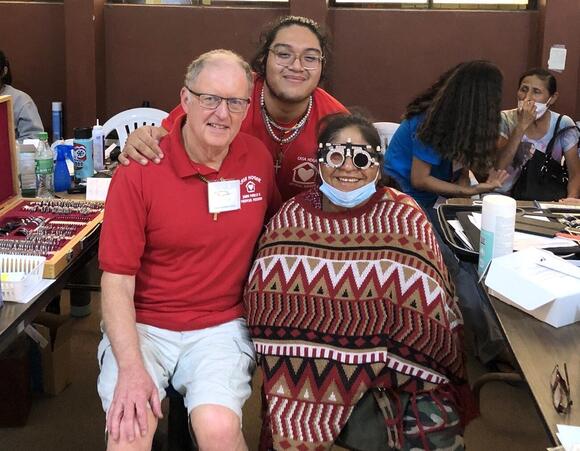
Most of us have old prescription eyeglasses sitting in a drawer somewhere collecting dust.
Thanks to a Wisconsin Lions Foundation recycling program and Lions clubs throughout the state, along with many volunteers, those spectacles can bring clear vision to those unable to afford prescription lenses.
Once dropped off at Lions Club recycling bins, used glasses begin a journey involving many hands and hearts that ends with the gift of clear vision. The combined efforts helped more than 100,000 people worldwide with their vision last year.
Lions Clubs throughout Wisconsin have recycle bins in their local communities to collect eyeglasses so they can be transported to the Lions Eyeglass Recycling Center in Rosholt, Wisconsin, where the Wisconsin Lions Foundation, Inc. is located.
In 2023, those bins collected more than 1 million pairs of glasses from local Lions Clubs like Marshall’s and were brought to the recycling center, according to its director, Keith Mueller.
Afterwards, more than 137,000 eyeglasses were made available for 86 different mission trips to developing countries, Mueller said. Missions of all sizes take glasses to those in need, with volunteers for the average one hauling 10,000 pairs. But organizers of smaller missions may request just 100 readers, he added.
The Wisconsin recycling center in Rosholt is one of just 19 like it in the United States, and it partners three Wisconsin correctional facilities — Stanley Correctional Facility, Oxford Federal Corrections and Columbia County Correctional Institute — where the residents help wash and sort the glasses.
Four workers at the recycling center do an initial quality check and reading to determine the prescription, Lions Foundation Executive Director Evett Hartvig said.
Finally, each individual pair is placed in a plastic bag marked with the prescription and sorted by men’s and women’s, Hartvig added.
After being returned to the recycling center in Rosholt, they are made available for optometrists and volunteers who give eye exams and find the best suited pair.
THE MISSIONS
Dr. Jim Bardenwerper is a retired optometrist from Davis Duehr Dean East Clinic in Madison. A Waunakee resident, Bardenwerper now volunteers his time giving eye exams and fitting people with glasses. In addition to working with the Speciality Care Free Clinic in Madison, he is also part of VOSH — Volunteer Optometric Services to Humanity — and travels to Peru.
At the Casa Hagar Juan Pablo Orphanage in Lurin, on the outskirts of Lima, Peru, he and a team provide exams to patients who travel far and wide for eye care.
But the work begins in Rosholt.
“The glasses are picked up in big suitcases, and between the members that go down on the mission trip, we bring those down,” Bardenwerper said.
One of the volunteers uses a computer software program to record each of the glasses’ prescriptions. Bardenwerper said each pair is enclosed in a plastic container and labeled.
“We have 8,000 pairs of glasses… the computer will come up with the four best options,” Bardenwerper said. “And then a volunteer will go find those four pairs. They’re tried on, and whichever one works out best is given to the patient.”
Often, the patients are wary about the cost for the exam.
“Some of them are brought to tears when they tell them no, the evaluation is free,” Bradenwerper said. “And then they ask about the glasses, and they are just delirious. We see so many extremely thankful people.”
Corrective lenses can also prevent further vision problems, according to Bardenwerper, particularly for children with a lazy eye who do not have enough stimulation to the optic nerve.
“So, not only are you helping them now, but preventing a big loss,” he added.
The volunteers have many unforgettable moments and stories to tell. Bardenwerper remembered one patent with a small plastic bag containing her Bible.
“I remember when we were able to put those lenses on, she was literally shaking. It was really quite emotional,” he said.
MORE THAN JUST GLASSES
Hearing aids can also be dropped off at Lions recycling bins as well, according to Waunakee Lion Dale Otradovic.
“They go to Starkey Labs, and we receive a credit back from them to purchase new hearing aids for those in need in the 10 Lions Districts in Wisconsin,” he said.
The Wisconsin Lions Foundation also benefits from the collection of broken glasses, according to Otradovic, as the metal can be harvested.
During the initial quality check at the Lions Foundation in Rosholt, when lenses are found to be scratched or broken, the plastic can be stripped off of the frames and any precious metals saved, Hartvig explained.
“After a build-up of so much weight, we have a goldsmith who picks it up and sells it,” she added, noting that the foundation waits until the price of gold is high to sell.
But it all starts with local clubs in Wisconsin communities with members who collect and transport the glasses to Rosholt.
“Lions Clubs should be very proud of the project that they have,” Hartvig said.
To locate your local Lions Club and learn where to recycle glasses locally, visit. https://www.lionsclubs.org/en/start-our-approach/club-locator
Anyone can request eyeglasses from the recycling center for mission trips. For information, contact Keith Mueller at wilionserc@wlf.info or visit the Wisconsin Lions Foundation website at www.wlf.info.
 Most Popular
Most Popular

Comments / 0